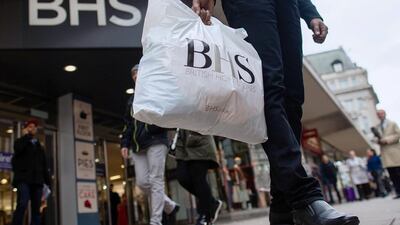The collapse of British Home Stores (BHS) is emerging as the most contentious corporate failure for years, with two parliamentary inquiries running simultaneously and more and more advisers and a property company being dragged into the net.
Administrators worked through the bank holiday to save the stricken stores group, but fears that it might run out of cash and close its doors by the end of last week were confounded by an unexpected upturn in trading as previously loyal shoppers responded to a “Come on Britain” promotion campaign and returned to it.
One grinning staff member was pictured at the Oxford Street branch saying: “We’re doing very nicely, thank you very much”.
It has been such a good trading weekend for the group that it raises the question: why did it go bust in the first place?
The administrators, Duff & Phelps, now have enough cash to replenish dwindling stocks and keep the group afloat until the middle of next month, by which stage they either have to find a buyer or close its 164 stores, taking 11,000 jobs down with it and leaving a £275 million (Dh1.47 billion) hole in the pension fund.
The latest of a line of groups to pull out of the bidding is the Portuguese family Soares dos Santos who had emerged – at least in the media – as the most likely buyer. Not so, alas: on Friday they said they had no interest, and never did have.
The field is now open to Greg Tufnell, best known in British circles as the brother of the former England Test cricketer Phil Tufnell but who is actually a more-than-competent retailer (he used to run Mothercare) and financier. He is the clear favourite to rescue BHS, which might have some life in it yet.
There is certainly life in the controversy, which will run and run. For those who have not been paying attention, the story, briefly, is this: Sir Philip Green, the high street-hero-turned villain, bought the company for £200m in 2000. He then stripped £500m in cash out of it, which was paid to his wife and family free of tax and a year ago sold the group (which had, by 2009, been transferred to his company Arcadia), by then losing more than £30m a year, to a former bankrupt, Dominic Chappell, for £1, leaving behind the pension fund deficit. Mr Chappell, with a record of business failure, lasted a year and the company went into administration.
Frank Field, the veteran Labour MP who chairs the parliamentary work and pensions committee, immediately began an investigation and for the past week has been grilling advisers (including Goldman Sachs), trustees and former managers about their role in the sale. Mr Green himself has yet to appear and the media is looking forward to that.
In the meantime, a new and more sinister line of inquiry has emerged involving the wealthy Dellal family, old friends and supporters of Mr Green, who advanced £35m to Mr Chappell when he bought the company, a critical element in completing the deal in the first place.
Paul Budge, Arcadia’s finance director, said over the weekend that: “We actually asked them to make sure that they deposit £35m … If we were going to go forward, they had to do that. So they put £35m into an escrow.”
Mr Chappell ran through it in a year but not before he had sold an office block owned by BHS to the Dellals, who promptly sold it on at an undisclosed profit.
The parliamentary committee is already having a field day with this little revelation, promising to haul the Dellals before them to explain “what persuaded them to agree to this extraordinary loan”. The rest of us would like to know the answer to that too.
The Dellals are among the canniest financiers in the business and do not support dud managers such as Mr Chappell out of the kindness of their hearts. Their fortune was founded by an extraordinary financier and property developer, “Black Jack” Dellal, who years ago a friend, who knew him well, described to me as “a money-making machine” with a finger in just about every deal going down.
Black Jack and Mr Green go back some years. In 1998, Mr Dellal backed Mr Green, then basically a fringe player on the retail scene, in a bid for the giant Sears retailing conglomerate, which failed. Mr Green was a comparative nobody at that stage, but two years later he bought BHS, which he used as his springboard to take over Arcadia and earn himself a fortune of more than £2 billion.
Black Jack passed away in 2012, aged 89, leaving a legal battle among his heirs (he had nine children by four different women) over a fortune, once estimated at £4.3bn, which had mysteriously shrunk to just £14.3m by his death (legend has it that he lost £1.7m in one night at the roulette tables). The Dellals now in the BHS spotlight are his son Guy and grandson Alexander, mysterious funders of Mr Chappell.
Mr Chappell is not their kind of person. And ploughing money into a loss-making retail chain being unloaded by someone as astute as Mr Green is not their kind of deal. We await the findings of Frank Field and his parliamentary committee with great interest.
Ivan Fallon is a former business editor of The Sunday Times.
business@thenational.ae
Follow The National's Business section on Twitter

